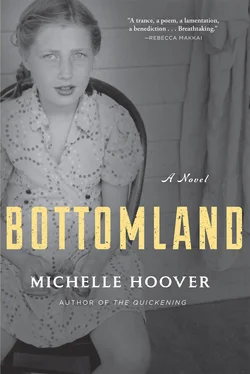At five after seven, we stood in our line. The air outside the windows was cold and black, as it had been that morning and the morning before. The line snaked over the gray tiles, workers pushing at each other’s backs. A man as round he was tall pulled a chain from his jacket, giving his watch a glance.
“Ladies and gentlemen, please.” He cleared his throat. “Workers, please, just a moment of your time.” The line went quiet. The man slipped his watch in his pocket.
Charlotte leaned close. “That’s Stanley Mills. He’s the fat duck they brought from New York. Say he’s reviewing the books.”
“Ladies and gentlemen. I’m sure you’ve all heard about the concern over market numbers.” A murmur from the crowd. At the far end, shouts. Mills wiped his face. “I’m here to insure you that Kuppenheimer and Company is as strong as ever, and that your company will remain in Chicago, where it was born. To prove this to you, we have decided to go forward with the raises the union negotiated and to which your owner, Henry Kuppenheimer, so generously agreed. We want to emphasize, however, that a company is only as good as the number of products it sells. Therefore, we are keeping the company store open late this week and next, newly stocked with a line of shirts, trousers, and smocks that we believe you’ll find well within your means. These things were made by your own friends. You should be proud to wear them. We hope you understand how essential it is that our workers are not only satisfied with their wages, but that they put this money to good use. So remember, every dime Kuppenheimer’s earns is money in your pocket too.”
“My pocket’s got a hole!”
“A hundred of those dimes ain’t half a nickel to us.”
Mills wiped his brow. “Well, yes. It all has to go around.” He raised his hand again before stepping back. “Thank you for listening. And remember, this week and the next.”
Voices echoed through the hall and the man hurried off. The squeak of rubber shoes, the stink of our uniforms. One by one we stepped into the office, and the guard at the door pushed a finger against his nose as if he’d never sweated once.
“Quarter an hour,” Preston told us. It wasn’t Kuppenheimer behind that door, but Preston, always Preston. The office was dark, save for those green underwater lamps, the curtains so thick they looked like blankets. Mills crouched by the wall, the arms of his chair pinching his stomach. Preston stood behind his desk with a metal box, two men in suits at his side. The men eyed his hands as he passed out the money, a clipboard and pen at their belts to cross off numbers, names. A quarter, that was more than ten percent. Of course they wanted to make a show of it. But when he counted out more for the man ahead of me, that quarter didn’t seem like much. The man worked the looms, a dark knot of curls on his head and skinny as a rail. He pocketed his bills without a glance, as if the suits might take them back.
I did the math. “That man got forty cents. His raise was almost twice.”
Charlotte hushed me. “Keep your voice down.”
Preston looked away as he counted bills into my hand, his fingers on my wrist as if I might drop so much at once.
“That man got more,” I said.
Preston closed the lid on his box. “You’re going to rob that man of his wages?” He pressed his knuckles into the desk. I smelled that metal on his breath, the suits tapping their pens. “He supports a family on that, missy.”
“Fifteen cents difference?”
“As your husband will make when you marry and no longer have to work.”
“Phsst,” I let out. The man from the looms, so thin you could see right through him, his fingers spindles, not enough for a woman to put a ring on if she tried.
“Girls can’t work the looms,” Preston went on. “A man could lose a finger every day when he does.”
“I wouldn’t lose a finger,” I said.
“A girl like you,” he said, “she’d look better outside this shop than in.”
“Phsst.”
Charlotte stamped my foot. For fifteen more cents I could buy myself a finger.
“That’s right,” Preston said. “You don’t know what hurt is. That man does. He’s a veteran. That’s why he’s forty cents.”
Charlotte pinched my arm and hurried me out. Behind us, Preston went back to his box. Outside in the hall the workers were asleep on their feet. So much for the show, I thought. But a quarter, that was something at least. And Preston, he was even more. Every time he pushed at me he was, though I had to work him until he paid me any kind of attention. A girl like you , he’d said. Finally somebody paid a little.
It was almost curfew as we rushed through the streets. The line had made us late, and Keyes wasn’t keen to open the door after she’d turned the lock. That’d be a lesson to us, she’d say. The woman was dropping the bolt when we hit the steps. “Good heavens,” she let out. “Like the dark raised you up.” She shook her head. “You missed your supper. I can’t keep plates for you. If I ever started that, they might as well stop the clocks, but you’ll find bread in the kitchen.”
“Only bread?” Charlotte asked.
“It’ll be a lesson to you, coming in late. So many of you girls late tonight. A half dozen I haven’t laid eyes on yet. It’s none of my business where a girl keeps herself, but if you want supper, you’ll sit at the table tomorrow as you’re intended.”
Twenty-five cents , I almost said. That’s what happened to the other girls, that and the line, while me and Charlotte stood up front and passed the others with our pockets full. Charlotte caught my arm. I guessed what she was thinking. If Keyes found out about the raise, she’d up the rent before we could turn our backs.
We hurried to the kitchen. A loaf of cracked wheat left from the morning, no butter. We broke off pieces with our hands. Charlotte stopped with her ear to the hall and went swift as a broom to the icebox. “I know just where she keeps the jam.” The bread was dry as my fingers, but I didn’t need iceboxes, not if Keyes might catch us. “Don’t you worry,” Charlotte went on. “I heard her tell Ellen she wanted to get rid of the whole lot. ‘Can’t fill the girls with sweets,’ she said. ‘It’ll spoil them something terrible.’”
“That’d be a lesson,” I said.
Charlotte grinned, pulling out a jar the color of blueberries. “Keyes is softer than she looks.”
“Soft as cracked wheat.”
“The nervous mother type. Anyone lays a hand on us, she’d give a limb to fix it. You and Myrle stay long, you’ll find out.” The way she said my sister’s name, it sounded sweet. Charlotte popped the lid, her ear to the hall again should Keyes get curious, and we dipped our fingers. On Charlotte’s wrist, a scar. It looked like a cut from a knife, poorly healed. It took the light in that old kitchen to see it at all.
“What’s that?” I pressed a finger to her wrist.
Charlotte jerked back. She rolled up her sleeve to show the scar. It traveled several inches up her arm. “This? It’s something I did once, long time ago. I was paying too much attention.”
“To what?”
She shook her head. “There are better ways to disappear from a place. You already know that.”
She rolled down her sleeve. The jam had left our nails sticky and cold. No matter how we sucked, we couldn’t get them clean.
“I know about you, Esther,” she said. “You think people don’t get you. But that’s just you, giving them too much say.”
We climbed the stairs stomach-sick. I opened our door and Myrle was hunched in bed under the dim lamp, her nightgown a tent from throat to shin, her head in a magazine. The cover of it was upside down. “I thought you’d never come.”
Читать дальше












